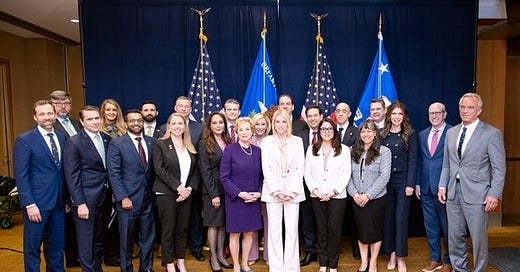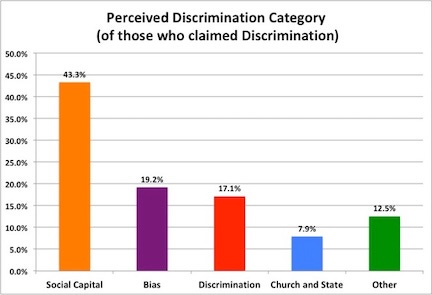Last week, the Trump Administration’s “Anti-Christian Bias” Task Force had their first meeting. According to their press release, Cabinet members were invited to share stories, alongside “peaceful Christian Americans who were unfairly targeted by the Biden Administration for their religious beliefs.”
The quoted phrase above tells us a lot about the purpose of this group. It seems that the goal is to attack the previous administration rather than seriously try to understand the diversity of view present among people of faith. It would appear that the quality most important to be a victim of anti-Christian bias is to be a conservative who disagreed with the policies and actions of the Biden White House. Here are some examples from the press release where Cabinet Secretaries describe the hardships faced by these Christians:
Additionally, members of the Task Force highlighted specific cases within their own agencies where the Biden Administration unfairly and harshly punished Christian Americans for their religious beliefs.
FBI Director Kash Patel discussed the impact of the anti-Catholic memo issued by FBI Richmond and reiterated the FBI’s commitment to rooting out any anti-Christian bias that could be directing decisions or investigations.
Secretary of State Marco Rubio raised several concerning allegations of bias, including some against Christian Foreign Service Officers who preferred to homeschool their children. In one case, a family was threatened with an investigation for child abuse and curtailment if they insisted on homeschooling. In another case, a family was referred to the IRS, threatened with prosecution, and investigated by Biden’s Inspector General for insisting they homeschool their son.
He shared how State Department employees were stigmatized for opposing the COVID-19 vaccine mandate on religious grounds, including being called “murderers” and “troublemakers.” In one instance, an ambassador yelled at an employee, accusing the employee of wanting to kill the ambassador’s mother despite her being back in the States.
Other reports alleged retaliation against employees for opposing DEI/LGBT ideology that violated their religious conscience. Employees recounted being required to push LGBT agendas while serving overseas, even in countries where such activity constituted a blatant violation of the acceptable religious beliefs and practices. He also detailed allegations that that religious freedom policy offices and programs were sidelined unless they were promoting DEI-related programs.
He also highlighted how Christian holidays at American embassies under the Biden Administration were frequently stripped of any religious overtones, but non-Christian religious holidays like Losar, Eid, or Ramadan, used proper names and appropriate celebratory greetings.
Patel was describing a favorite Republican talking point, where a local FBI office put out a memo raising concerns about violent traditionalist-Catholic extremists in the context of awareness of domestic terror sources. All the Republicans heard was Traditional Catholics, which is not the same thing. An FBI review found there was no bias present. The memo was quickly taken down.
Rubio’s examples raise more questions than they answer. Under what circumstances were home schooling choices seen as child abuse? Was that government policy or the action of a local official? Was the supervisor really calling those refusing the Covid vaccine “murderers”? Was that official government policy? What does it mean to oppose “DEI/LGBT ideology”? I’ll admit, the holiday thing can make Christians feel bad, but does that really represent favoring Eid over Easter?
All of these examples show the need to clarify what is meant by bias. Taken at face value1, did these actions take place because the Biden Administration was attacking Christians or because of generally applicable policies that the victims didn’t like? It seems like some notion of intent would be necessary to show bias; that the actions taken happened because the recipient was a Christian.2
The vagueness surrounding what constitutes bias reminds me of a project I did as part of The Book That Died. I had gathered data from 835 Nazarene clergy to explore generational differences between Boomers and Millennials. One question on my survey asked if they had ever felt discriminated against because they were Christians. There were 237 people who said yes. The follow-up asked them to describe how this happened. I coded these into categories as follows.
It’s the first two of these categories that came to mind when reading about the task force. Combining the loss of social capital with a perception of bias accounts for over 60% of all cases. The former involved having social relationships disrupted because of religious beliefs. The latter involved assumption that one was ill-informed or “a right-wing nut”.
It’s not clear to me that these perceived slights don’t simply involve the difficulties of living in a pluralistic culture where people choose friends based on shared values. Certainly in our more polarized age, making assumptions about the Wrong Other seems to be par for course. Unless, of course, conservative Christians are supposed to be federally protected from not having their views universally endorsed.
Not only does the “Anti-Christian Bias” Task Force have problems being clear on what constitutes bias, they also aren’t clear on who is included in the label Christian. How do administrative actions removing federal funds from Catholic Charities fit this picture? Or Christians protesting draconian budget cuts or harsh court decisions?
Last week Sean Feucht and friends hosted a praise worship service in the White House! It was apparently a great celebration connected to Paula White’s Office of Faith. I’m still waiting to see what other expressions of Faith get equal time in the White House.
Today, Revs William Barber and others were arrested for praying in the Capitol Rotunda. As Jack Jenkins reports:
The arrests occurred roughly 15 minutes after Barber, the Rev. Jonathan Wilson-Hartgrove and Steve Swayne, director of St. Francis Springs Prayer Center, started praying in the Rotunda as dozens of police stood nearby, some prepared with plastic handcuffs. The three took turns praying, lamenting potential budget cuts to social safety-net programs such as Medicaid, often chanting together: “Against the conspiracy of cruelty, we plead the power of your mercy.
Jack notes that in March of 2023, Sean Feucht and others held a worship service in the Rotunda. He suggests that there may be a difference on what time of day the event occurred as Feucht’s was in the evening.
Still, it’s hard to not come away thinking that there is one rule for Conservative Christians — whose views must be legitimated — and other Christian voices. To say nothing about the rights of the non-religious.
It is a puzzle that we need an “Anti-Christian Bias” Task Force when states are mandating the presence of Bibles and the Ten Commandments in classrooms. This week the Supreme Court will hear arguments on an Oklahoma case regarding a Catholic school that wants recognition as a state-approved Charter school3.
But when nearly 60% of White Evangelicals believe Christians are discriminated against — more than Muslims, Blacks, and Gays — I guess you need a government task force to let them know that they are right.
And some shouldn’t be taken at face value. The claim that Liberty and Grand Canyon were fined for their religious values doesn’t hold up to scrutiny. The former was fined for filing inaccurate and incomplete Clery Act documents (about crime on campus) and the latter was fined for misleading advertising about its doctoral programs.
Justice Scalia’s point in Smith v. Oregon.
Which has major implications for both religious schools and the entire Charter School Movement.







Which one will be the Inquisitor General?